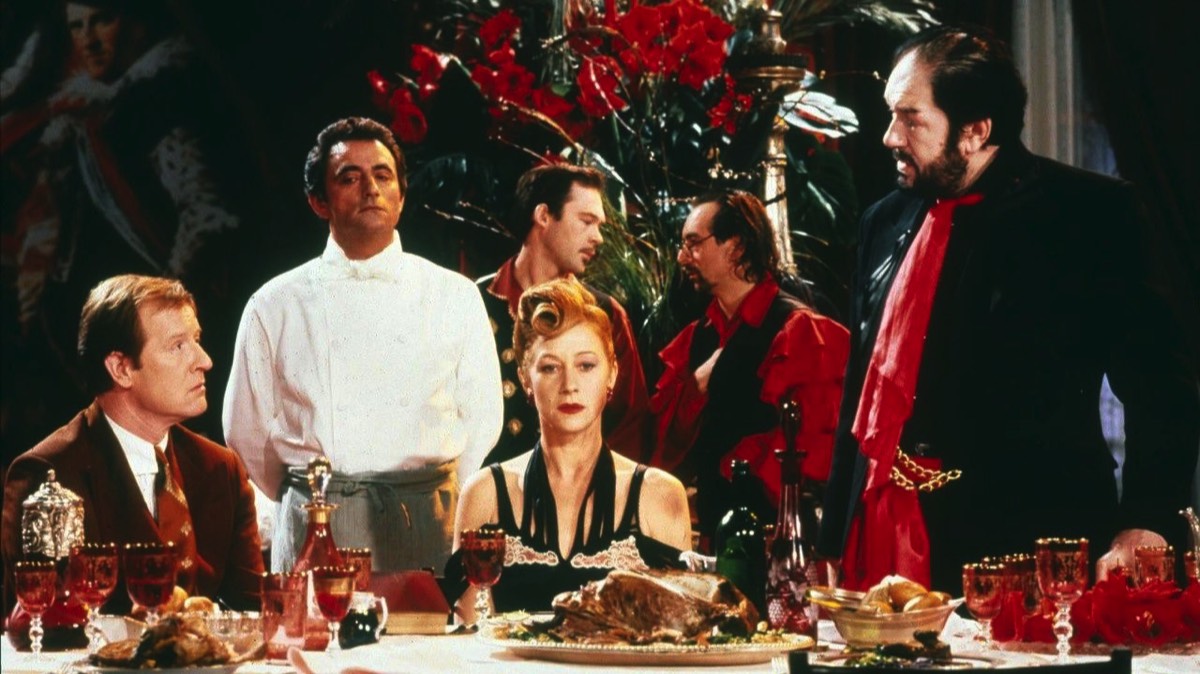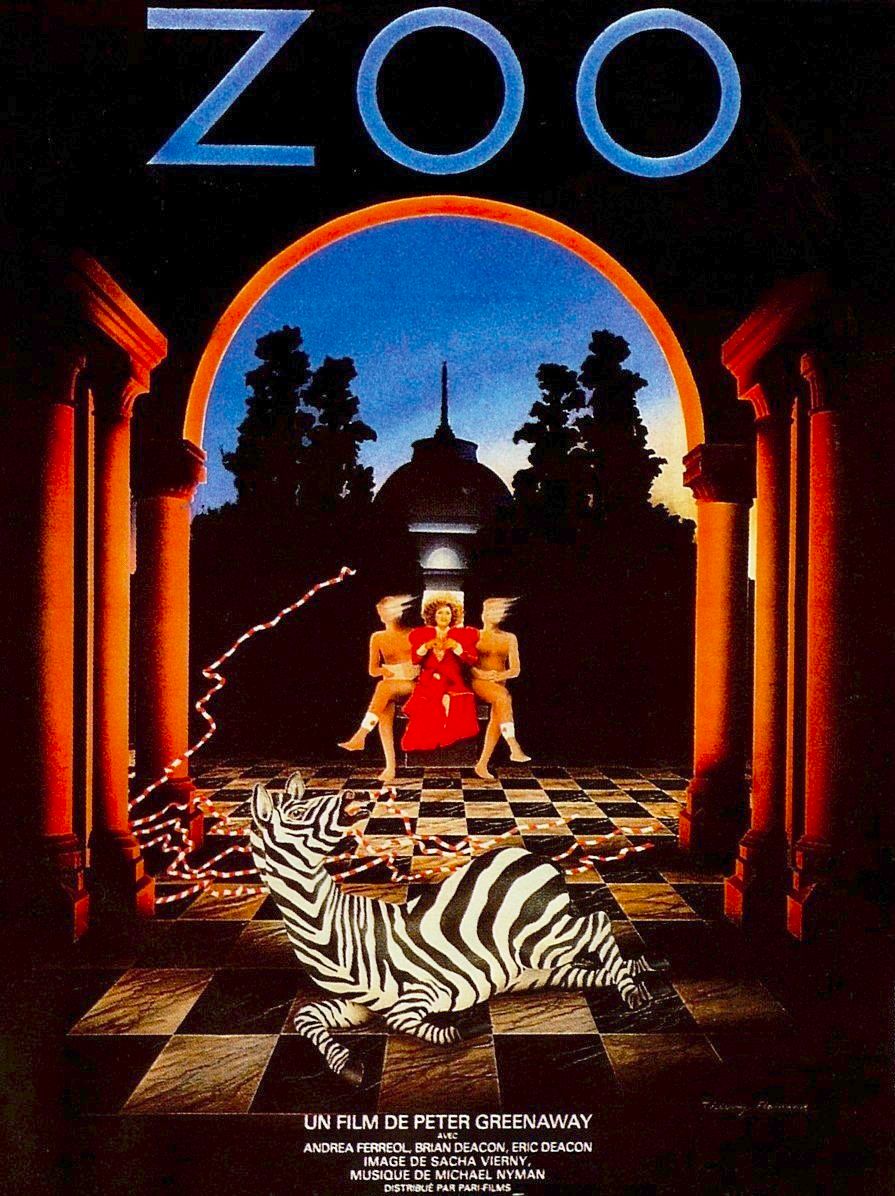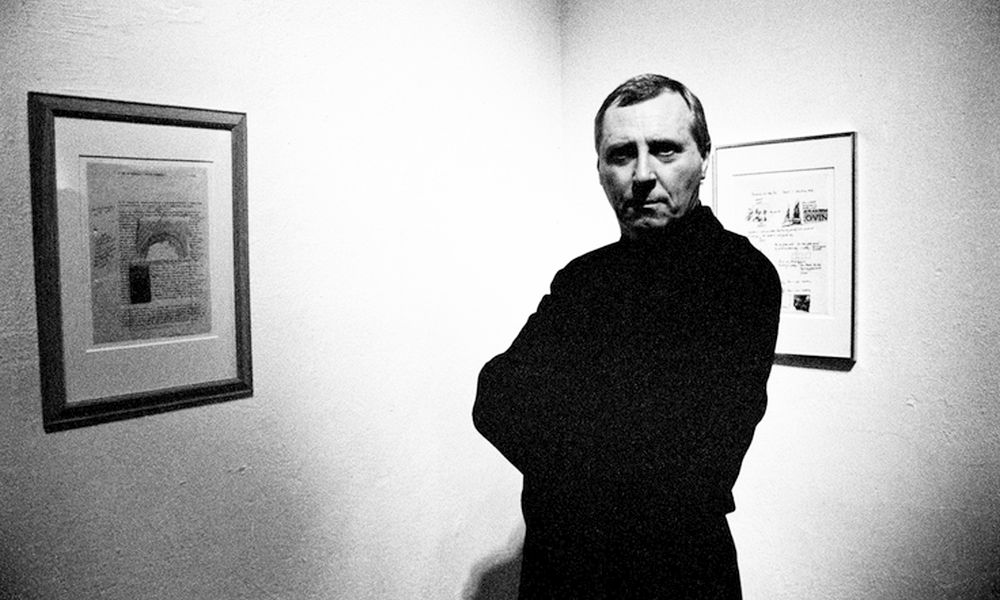"British director, whose highly intellectual films, described by Chris Auty as 'beautiful butterflies trapped down by drawing pins', have moved from the seclusion of the avant-garde cinema of the 1970s to success with art-house audiences since The Draughtsman's Contract in 1982." - John Caughie (Encyclopedia of European Cinema, 1995)
Peter Greenaway
Director / Screenwriter / Editor
(1942- ) Born April 5, Newport, Gwent, Wales
(1942- ) Born April 5, Newport, Gwent, Wales
Key Production Countries: UK, Netherlands, France, Germany, Luxembourg, Italy, Spain
Key Genres: Avant-garde/Experimental, Comedy Drama, Black Comedy, Drama, Surrealist Film, Documentary, Erotic Drama, Short Film, Biography, Period Film
Key Collaborators: Kees Kasander (Producer), Reinier van Brummelen (Cinematographer), Sacha Vierny (Cinematographer), Michael Nyman (Composer), Elmer Leupen (Editor), John Wilson (Editor), Jan Roelfs (Production Designer), Chris Wyatt (Editor), Ben van Os (Production Designer), Jordi Mollà (Character Actor), Raymond J. Barry (Leading Actor), J.J. Feild (Leading Actor)
Key Genres: Avant-garde/Experimental, Comedy Drama, Black Comedy, Drama, Surrealist Film, Documentary, Erotic Drama, Short Film, Biography, Period Film
Key Collaborators: Kees Kasander (Producer), Reinier van Brummelen (Cinematographer), Sacha Vierny (Cinematographer), Michael Nyman (Composer), Elmer Leupen (Editor), John Wilson (Editor), Jan Roelfs (Production Designer), Chris Wyatt (Editor), Ben van Os (Production Designer), Jordi Mollà (Character Actor), Raymond J. Barry (Leading Actor), J.J. Feild (Leading Actor)
"One of Britain's leading auteurs, Greenaway trained as a painter before spending eleven years, beginning in 1965, as a film editor. During this period he began making short, highly formalist films influenced by structural linguistics, ethnography and philosophy… An acclaimed study of 18th-century sexual intrigue set in an English country house, The Draughtsman's Contract staked out its director's central concerns with formal symmetries and parallels; each element of the plot was mirrored and repeated several times in order to create an elaborate, baroque structure, which proved popular with critics and public alike." - The Hollywood.com Guide to Film Directors, 2004
"Greenaway is not to everyone’s taste—but he does not claim to be. “I have often thought it was very arrogant to suppose you could make a film for anybody but yourself.” Which doesn’t mean that the lone, self-sufficient artist may not also be marked by arrogance. Greenaway is a filmmaker as one might be a modern painter or an experimental novelist. Despite the considerable art-house success of both The Draughtsman’s Contract and The Cook, the Thief…, he is not just a confessed intellectual, but someone fascinated by games, number theory, structuralist principles, and unmitigated aesthetics." - David Thomson (The New Biographical Dictionary of Film, 2010)

The Cook, the Thief, His Wife & Her Lover (1989)
"Expect a film by Peter Greenaway to both offend and impress you. You could equally be entering Greenaway's own private art gallery or the jaws of hell. The visual detail in Greenaway's work is amazing, be it after the style of Breughel or Bosch, although his narratives are spare and often elliptical. He has flirted with mainstream acceptance more than that other master of painterly, if often repellent images on film, Derek Jarman, but has always veered away again to the fringes of homo-erotic fantasy." - David Quinlan (Quinlan's Illustrated Guide to Film Directors, 1999)
"Greenaway boasts what is arguably the most playful c.v. of any major living director, overflowing with visual puns, mathematical puzzles and imaginary languages. He’s obsessed with lists, maps and all manner of taxonomic tools that humans have designed to make sense of a chaotic world (that’s his structuralist impulse in action), even as he so clearly takes pleasure in subverting those very same systems (for which he’s been labeled a “poststructuralist” by those who share his affinity for classification)." - Peter Debruge (Variety, 2022)
"There are contradictions in Greenaway’s works, a fact that seems to openly provoke divided opinion. Some would suggest that the fecundity of his vision and intellectual rigor are the stuff of great cinema; others, while admitting his originality, would still look for evidence of a deeper engagement with film as a medium, rather than as a vehicle for ideas. Lauded in Europe, under-distributed in the United States, loved and reviled in his own country, Greenaway is, nevertheless, in an enviable position for a filmmaker." - Saul Frampton & Rob Edelman (The St. James Film Directors Encyclopedia, 1998)
"Peter Greenaway is one of Britain's most original and controversial directors… In addition to his work as a film-maker, he has also produced paintings, written books, had several one-man shows and curated exhibitions worldwide… Greenaway retains control over his films by working independently and generally writing his own scripts. His films are characterised by consummate design, lavish photography (Sacha Vierny often acts as cinematographer) and evocative scores (usually Michael Nyman)." - Pauline Reay (Contemporary British and Irish Film Directors: A Wallflower Critical Guide, 2001)
"Both the tone and content of his films are cool (his dark tales of devious scheming and deadly revenge and insistence on the vulnerability of human flesh have provoked charges of misanthropy), but the stately tracking shots, ornate compositions, barbed, witty dialogue and endless allusions can be enthralling: watching a Greenaway film is akin to seeing a bizarre encyclopaedia come to life." - Geoff Andrew (The Director's Vision, 1999)
"I’m not really interested in authenticity. I don’t think cinema has ever been ‘real’. It is much more fantasy-related, I suppose, and some of my heroes are the novelists of South American magical realism, especially Borges and Márquez. Their ability to slip in and out of reality. Reality is happening in the street outside my house; why should I try to reproduce it in the cinema? Maybe the most powerful and amazing thing all of us have is the human imagination. So let’s deeply involve that into the process." - Peter Greenaway (BFI, 2022)
Selected Filmography
{{row.titlelong}}
Peter Greenaway / Favourite Films
Blade Runner (1982) Ridley Scott, Breathless (1960) Jean-Luc Godard, Citizen Kane (1941) Orson Welles, 8½ (1963) Federico Fellini, Gladiator (2000) Ridley Scott, Ivan the Terrible (1944/1946) Sergei Eisenstein, Jules et Jim (1962) François Truffaut, Last Year at Marienbad (1961) Alain Resnais, The Seventh Seal (1957) Ingmar Bergman, Throne of Blood (1957) Akira Kurosawa.
Source: Sight & Sound (2022)
Blade Runner (1982) Ridley Scott, Breathless (1960) Jean-Luc Godard, Citizen Kane (1941) Orson Welles, 8½ (1963) Federico Fellini, Gladiator (2000) Ridley Scott, Ivan the Terrible (1944/1946) Sergei Eisenstein, Jules et Jim (1962) François Truffaut, Last Year at Marienbad (1961) Alain Resnais, The Seventh Seal (1957) Ingmar Bergman, Throne of Blood (1957) Akira Kurosawa.
Source: Sight & Sound (2022)
Peter Greenaway / Fan Club
Kerem Akca, David Sterritt, Joel Schumacher, George Wu, Clément Cogitore, Matt Zoller Seitz, Jonathan Romney, Andrey Zvyagintsev, Samuel Wigley.
Kerem Akca, David Sterritt, Joel Schumacher, George Wu, Clément Cogitore, Matt Zoller Seitz, Jonathan Romney, Andrey Zvyagintsev, Samuel Wigley.
"Fan Club"
These film critics/filmmakers have, on multiple occasions, selected this director’s work within film ballots/lists that they have submitted.
These film critics/filmmakers have, on multiple occasions, selected this director’s work within film ballots/lists that they have submitted.


